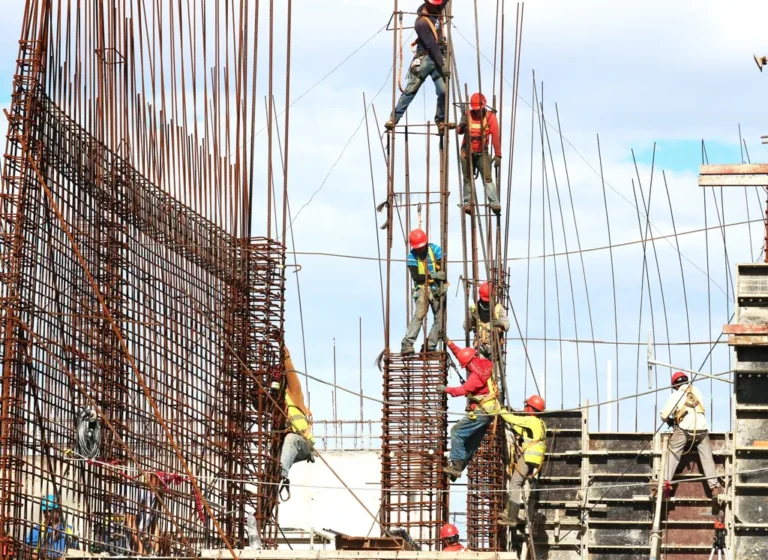Demand for building materials is expected to keep rising in the UAE amid a construction boom and the launch of new projects by property developers, a senior executive has stated.
Dubai is building a new terminal at Al Maktoum Airport with a total investment of AED 128B ($34.8B) to expand its capacity to 260M passengers. Developers, including Emaar Properties, have announced projects near the area, anticipating higher demand from buyers.
Developers have also revealed new projects in other parts of the Emirates as property demand continues to rise along with increasing prices.
“The new terminal at Dubai airport and all the developments in Abu Dhabi indicate strong demand. We expect this demand to grow in the foreseeable future,” said Hugo Losada, chief executive of building materials at Emirates Steel Arkan.
He was speaking to The National on the sidelines of the Make it in the Emirates forum that concluded in Abu Dhabi on Tuesday.
Emirates Steel Arkan sold AED 1B worth of building materials in the UAE last year and expects a 5 to 10 per cent growth in sales in 2024 amid new construction projects, Mr Losada stated.
“We expect single-digit growth in sales because of the construction boom that’s happening.”
Listed on the Abu Dhabi Securities Exchange, Emirates Steel Arkan is the largest public steel and building materials business in the UAE.
The company produces steel, cement, concrete blocks, and PVC pipes used in the construction industry.
It was formed after the merger of Emirates Steel and Arkan Building Materials in 2021.
The building materials division contributes 20 to 25 per cent of the overall profit of Emirates Steel Arkan and 10 to 15 per cent towards its overall revenue, Mr Losada stated.
Emirates Steel Arkan recorded a net profit of AED 601.9M last year, while its revenue reached AED 8.9B.
Meanwhile, the building materials division reported revenue of AED 871M last year, with profit reaching AED 145M.
Outside the UAE, the company exports building materials to countries such as Bangladesh and Sri Lanka.
It owns the largest cement factory in the country, located in Al Ain, with a capacity of 4.6M tonnes. Emirates Steel Arkan also has plants in Abu Dhabi for the production of pipes and concrete blocks.
The company is contributing to the Make it in the Emirates initiative as well as Operation 300bn, which aims to position the country as an industrial centre by 2031, Mr Losada stated.
“We have a very high level of in-country value because the raw materials are mainly sourced locally, in terms of cement, in terms of blocks,” he said.
Operation 300bn, launched in 2021, focuses on increasing the industrial sector’s contribution to gross domestic product to AED 300B by 2031, from AED 133B in 2021.
The UAE industrial sector’s contribution to GDP reached about AED 197B last year, with the country achieving 30 per cent of Operation 300bn’s target so far.
Mr Losada added Emirates Steel was playing a crucial part in Abu Dhabi’s manufacturing industry, with a contribution of 11 per cent.
While the company does procure some components for pipes from abroad, it is hoping to soon start sourcing them locally.
Emirates Steel Arkan spent AED 2.4B on local procurement last year, up 34 per cent compared with the previous year.
The company buys scrap locally to recycle as part of its decarbonisation drive, as well as limestone and other raw materials, Mr Losada stated.
“Local purchase, at the end of the day, is a win-win solution for us as well.”
Meanwhile, Dubai Industrial City, which is part of Dubai-listed Tecom Group, attracted investments worth AED 2.8B in the last 18 months as the UAE continues to focus on the growth of the industrial sector and attract more investment into the country.
The free zone attracted investments in sectors including food and beverages, building materials, transport and machinery equipment, Saud Alshawareb, executive vice president of industry at the Tecom Group, told The National.
“The ecosystem that we provide – the ease of doing business, being close to one of the busiest ports in the world, which is Jebel Ali port, as well as Al Maktoum airport – helps companies to boost exports because of better connectivity,” he said.
The new comprehensive economic partnership agreements signed by the UAE with different countries including India, Turkey and Indonesia also help companies to export “Made in UAE” products to different markets at competitive prices, he said.
The UAE has signed 11 Cepas so far with countries in Asia, Africa and Latin America.
Dubai Industrial City also bought 13.9M square feet of new land from Dubai Holding Asset Management for AED 410M amid higher demand.
“This was mainly because of last quarter, the inventory of land that we had, occupancy-wise had reached 97 per cent,” Mr Alshawareb said.
“So, this was an immediate reaction from our side to launch that 13.9M to cater to the demand of the industrial companies that are willing to expand and grow within Dubai.”
There are currently more than 300 operational factories in the free zone, with more than 1,000 business partners using its facilities.


